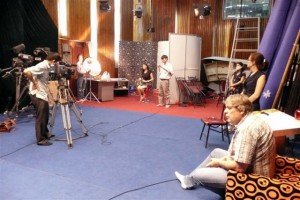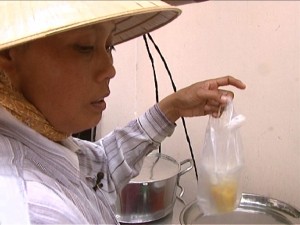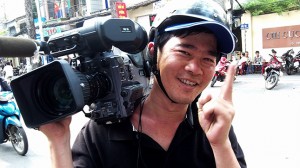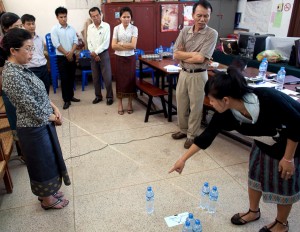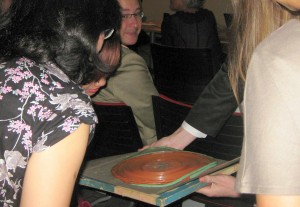Teaching TV interviews in Vietnam
A good interview should be informative, authentic, credible and sometimes even surprising. In the past two weeks, the participants in our workshop ‘Advanced Interview Training’ were able to discover the special benefits of this journalistic format.
Together with my colleague Uli Köhler, I am training journalists in the Vietnamese capital Hanoi. Our 15 trainees work for Vietnam Television (VTV). Most of them are reporters in Hanoi, but we’ve also got the VTV correspondents to Russia and to China in our group. All of our participants are keen to learn more about conducting interviews and recording vox pops.
As Uli and I will leave Vietnam in a couple of days, the trainees are now working on their final productions. Their topic is ‘same-sex marriage in Vietnam’. They chose this topic themselves after an hour-long discussion.
![]() read more
read more
A small, great story
The surprising outcome of a documentary workshop by DW Akademie’s Asia division
The best stories can be found on the street. That’s a well worn saying but it’s true – at least in the eyes of a documentary filmmaker. Some of DW Akademie’s trainees discovered one of those stories waiting in Ho Chi Minh City, Vietnam.
She’s the “sweet soup seller” and you can’t miss her. She sets up shop outside the broadcasting center and we always see her during our workshop breaks. She packs everything she needs for her “mobile restaurant” in big baskets balanced on a bamboo pole – typical for Vietnam street vendors. Her specialties are sweet snacks and desserts …
It’s more than obvious that the staff at the state TV broadcaster VTV loves her sweet soya broth, green and brown beans cooked in sugar, mango puree with ice and homemade lime custard. At lunchtime her colorful plastic stools quickly fill up and her numerous pots overflow with ingredients. The customer-service concept behind the portable dessert bar corresponds to the well-established western coffee shops and fast food chains in the country: you can have your goodies on the spot or for take away – in a handy plastic cup with a spoon and small bag.
We decide that this hardworking, talkative woman is perfect for one of our hands-on exercises. On the second day of our “Short Documentaries” workshop some participants spend an afternoon observing her with the camera. So far, there’s no storyboard or script: participants have to shoot simple actions in short sequences: A mango puree with ice in three cuts.
![]() read more
read more
Action learning in Laos
DW Akademie trainer Daniel Hirschler sends this report from a workshop in Laos.
As a trainer, I like working with what I call “action learning settings”. This basically means designing the workshop in a way that learning happens in a good mix of experiencing something and then talking about it and reflecting upon the experience.
Workshop designs are like recipes for cooking: It’s not just the amount of the ingredients that counts, it’s also their quality. And as with any recipe, things can work out perfectly, but they can also go terribly wrong. So for a trainer, going into an action learning workshop can be fraught with tension. Will things work out? What if they don’t…?
![]() read more
read more
Asian and German experts make sound archives accessible for journalists
Journalists who want to add archived sound material to current affairs stories usually have one big problem: how can they find relevant material in a broadcaster’s archive?
For the keepers of these archives, it’s a challenge to catalog sound material so that it’s easily accessible to journalists. And if the material is on tape or analogue disks, the archive workers also have to find ways to restore and digitize the carriers. Tapes deteriorate easily – especially in tropical climates.
These are key issues that Heidrun Speckmann and Nguyen Pham Hoa Binh (free media consultant in Vietnam) discussed with an international audience at the German Embassy in Hanoi on May 8th, 2012. Heidrun Speckmann has been working as CIM integrated expert and DW Akademie’s Media Archive Developing Consultant at Radio The Voice of Vietnam (VOV) since September 2009.
At the German Embassy, the two archive experts presented their long-term consulting projects aimed at modernizing the sound archives of Asian broadcasters. These projects are financed by Germany’s Federal Ministry for Economic Cooperation and Development (BMZ).
![]() read more
read more
Myanmar: Heading towards freer media
 After decades of censorship, Myanmar is aiming to democratize its media system. In cooperation with UNESCO, the government recently arranged an international media conference. DW Akademie was there.
After decades of censorship, Myanmar is aiming to democratize its media system. In cooperation with UNESCO, the government recently arranged an international media conference. DW Akademie was there.
“I would like to see you all again – in a country with a free and democratic media,” said Ye Htut, Director General of Myanmar’s Ministry of Information, as he said goodbye to the 250 participants attending the media conference in Rangoon.
Until recently, a statement like that would have been unthinkable. “I’m experiencing Myanmar as very open in an impressive way. The atmosphere in this remarkable conference is honest and very sincere,” reports Helmut Osang, DW Akademie’s coordinator for media development.
![]() read more
read more



